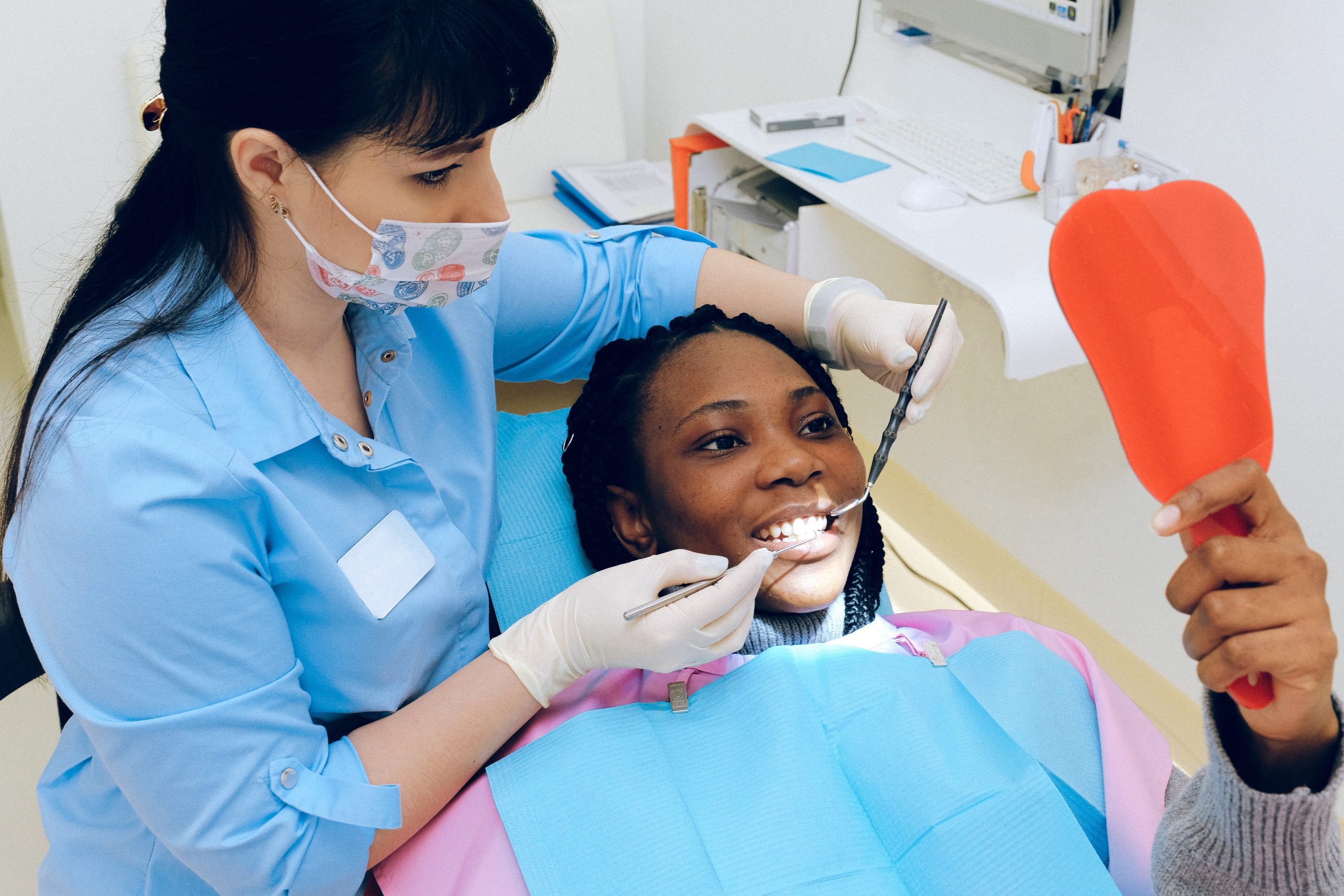Dentist Las Vegas are doctors who specialize in the oral health of patients. They work as part of a dental team that includes assistants and hygienists. They also collaborate with medical specialists and physicians.
Dentists perform many primary health care activities, such as screening for cancer and other head and neck diseases, recommending fluoridated water, smoking prevention, and nutritional counseling.

When your teeth, gums and mouth are healthy, they work together to speak clearly; taste and crush foods; and express feelings through smiling. They also protect the rest of your body from disease and infection, including heart disease, diabetes and certain cancers. Keeping your oral health at its best is the primary goal of modern dentistry. Achieving this goal requires a commitment to preventive care, including daily brushing and flossing and regular dental visits for inspections and cleanings.
The foundation of good oral hygiene is effective plaque removal. A sticky, colorless film of bacteria that covers the teeth, plaque leads to tooth decay and gum disease when it is not removed regularly.
A regular brushing and flossing routine, combined with a nutritious diet, will help you maintain optimal oral health. You can improve your habits with the help of a dental hygienist, who can teach you the best techniques and assist with trouble spots, such as crowded or cracked teeth. A hygienist can also recommend products to aid in your dental hygiene, such as an interdental cleaner like dental water floss that removes plaque from places the toothbrush can’t reach and stimulates blood flow to the gums.
Good oral hygiene also includes avoiding tobacco and other harmful substances, such as acidic beverages and sugary foods. If you do use tobacco or other harmful substances, your dentist can advise you on how to quit using these products. Good oral hygiene also involves scheduling twice-yearly dental checkups and cleanings to keep bacteria under control and identify problems early, before they become more serious.
Practicing good oral hygiene can reduce the risk of many health conditions, including heart disease, stroke, diabetes and chronic kidney disease. Studies have shown a correlation between poor oral health and some systemic pathologies, such as gingivitis, bad breath, respiratory infections, dementia, low birth weight and preterm labor. The good news is that you can prevent most dental diseases with a good oral hygiene routine and regular visits to the dentist for dental examinations and cleanings. These measures, along with a balanced diet and regular exercise, can help you achieve a lifetime of excellent oral health.
Unlike traditional medical care, which focuses on treating health problems after they become apparent and are already causing symptoms or complications, preventive healthcare seeks to improve overall wellness by identifying and addressing health issues before they have the opportunity to manifest. This approach can help reduce health disparities, improve the quality of life, and significantly cut healthcare costs in the long term.
Preventive services include screenings, tests, checkups, patient counseling and vaccines that define risks for, prevent, or recognize diseases and other health problems. These services are generally considered “routine health care” and are covered at no cost by most insurance providers when you see an in-network provider.
Regular wellness checks and screenings allow healthcare professionals to monitor your overall health, including your oral health, and identify issues like high blood pressure or cholesterol early. These issues are easier to treat and have the potential to extend your lifespan by helping you get or stay healthy, and by reducing the risk of chronic conditions like heart disease.
Preventive care also includes health education, empowering individuals with the knowledge and resources to make healthy choices that can lead to a happier and healthier lifestyle. This may include discussing dietary habits, the benefits of exercise or lifestyle changes that can lower your risk for certain conditions.
Preventive care can also be beneficial for the community as a whole by reducing the spread of infectious diseases. For example, immunizations can help protect children and adults from diseases like tetanus, chicken pox, measles, the flu and others. Vaccinations are among the most effective preventive measures and help safeguard both individuals and their communities from potentially fatal infections. In addition, healthcare systems can provide outreach programs and mobile clinics to make preventive services more accessible and inclusive in underserved communities. This ensures that everyone can enjoy the benefits of prevention, regardless of their economic status or geographic location.
Restorative care is a more appropriate type of therapy for some patients who no longer require acute or intensive rehabilitation. This type of treatment involves less invasive therapies that can help patients with their daily activities while providing comfort and ensuring that they are safe to move around. A PSW training program can prepare you to assist with these types of treatments.
The goal of restorative care is to prevent a patient from further deteriorating or becoming more dependent on assistance with their daily tasks, such as dressing, eating and bathing. It also helps to improve their quality of life and promotes a sense of well-being. Your responsibilities in this type of care can include:
- Assisting with range-of-motion exercises and splints.
- Providing assistance with mobility and transferring.
- Orienting residents to their surroundings and helping them adjust to new physical limitations due to amputation or illness.
You may also be responsible for applying and removing supports, such as casts or braces, preparing meals, administering medication and maintaining records.
Some of the most significant challenges that you can expect to face in a restorative care role involve overcoming resistance from clients who have not been rehabilitated before or who have cognitive deficits that make participation difficult. For instance, residents who have dementia can be reluctant to participate in exercises that require them to move their bodies or may fear they will fall or become injured.
In these situations, it is important to provide consistent encouragement and praise to encourage the client to keep trying, especially if their progress seems slow or minimal. This can be challenging, but the rewards are often worth it, particularly when it results in improved physiological and psychological outcomes. For example, studies of Medicare supported restorative care programs show that participants who receive this type of care have better depression and quality-of-life scores than those who do not.
Continuing education in restorative care is an excellent way to stay abreast of the latest methods and techniques in this field. It can also help you build a network of other professionals who can provide support and guidance. You should also try to take advantage of any training opportunities that your employer offers.
Dentists are often the first line of defense for teeth and gum problems, such as swollen or bleeding gums, tooth decay or a loose tooth. They are also on the lookout for the early signs of mouth cancer, which is a common problem that can be detected during routine oral exams and preventive care.
In addition to educating patients about how to maintain good oral health, dentists are skilled communicators and frequently step in to correct the consequences of less-than-stellar oral hygiene habits. This can include a cavity that has gone untreated for some time, or a painful abscessed tooth that requires root canal therapy and even surgery.
While most dental professionals do general dentistry, some specialize in specific procedures. A restorative dentist focuses on performing treatments such as dental implants, crowns and bridges and veneers to restore missing or damaged teeth. A periodontist specializes in the prevention, diagnosis and treatment of gum disease. A prosthodontist is highly trained in cosmetic dentistry, and is skilled at creating a variety of false teeth such as dentures and dental implants.
Another specialty is the dental anesthesiologist, who prepares and administers anesthesia for surgical procedures that involve the mouth and jaw. Similar to a medical anesthesiologist, this oral specialist focuses on keeping patients comfortable and healthy during and immediately after oral surgeries or diagnostic tests.
Other dentists focus on public health and work to improve oral care within their communities. They design programs that are geared toward disease prevention, and they perform community outreach and education. Some are forensic dentists, who analyze teeth and jaw bones for evidence used in legal cases.
While the dental profession isn’t as well-known as other medical fields, its role in promoting overall health is vital. The intensive academic and clinical training that dentists undergo, as well as their ability to perform a range of diagnostic and therapeutic procedures, contribute to the fact that dental disease is almost entirely preventable. However, the future of dentistry will likely be affected by changes to tax and healthcare policies and increased competition from allied health professionals.
